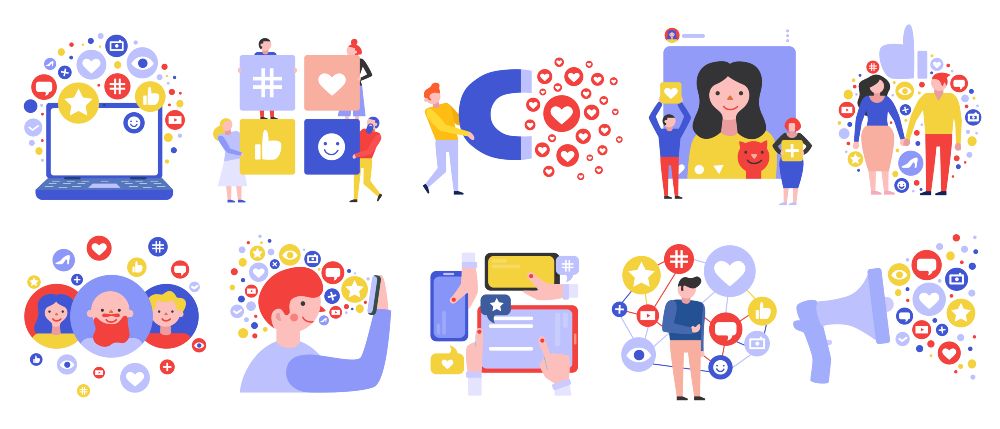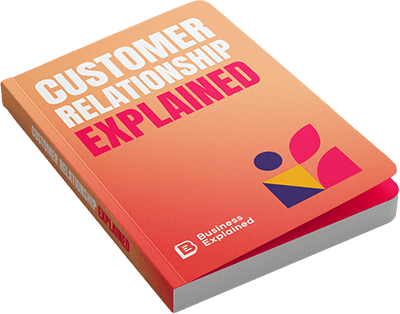Table of Contents
- What is a relationship marketing strategy?
- #1 Personalization as a relationship marketing strategy
- #2 Loyalty programs
- #3 Content marketing
- #4 Customer feedback and surveys
- #5 Customer service excellence
- #6 Social media engagement
- #7 Email marketing
- #8 Community building
- #9 Referral programs
- #10 Corporate social responsibility (CSR) initiatives
- Relationship marketing best practices
- How to implement a relationship marketing strategy?
- Challenges of relationship marketing strategies
Companies are no longer just vying for one-time sales; they strive to build lasting relationships that transcend the initial transaction. This shift has given rise to relationship marketing, which places the customer at the heart of business efforts. Rather than focusing solely on acquiring new customers, relationship marketing emphasizes nurturing and retaining existing ones by delivering consistent value, personalized experiences, and exceptional service.
This blog will explore ten powerful relationship marketing strategies to help businesses cultivate solid and enduring relationships with their customers. We’ll also delve into best practices, provide real-world examples, and discuss the challenges and implementation tactics that can make or break your efforts. Whether you’re new to relationship marketing or looking to refine your approach, this guide offers valuable insights to help you build lasting connections.
What is a relationship marketing strategy?
A relationship marketing strategy is generally a business approach oriented toward creating, maintaining, and improving long-term relationships with customers. Unlike traditional marketing, which typically emphasizes short-term sales and transactions, relationship marketing nurtures customer loyalty and develops an emotional linkage of the brand with its customers. This strategy converts first-time buyers into repeat customers who would then become staunch ambassadors for the brand, hence promoting stable business growth.
The very foundation of relationship marketing is that, through investment in customer relations, businesses can be put in a better position to reduce churn, increase customer lifetime value, and create positive word-of-mouth referrals. It will major in excellent customer service, consistent customer value, and personalized communication, rendering these the most critical factors to the business’s overall success in a relationship marketing strategy.
One key aspect of relationship marketing is understanding customers’ needs and preferences at a granular level. This requires leveraging data and insights to tailor interactions and offerings to each customer segment. For instance, a brand might use customer data to send personalized offers or recommend products based on past purchases. The goal is to make customers feel valued and understood, fostering loyalty.Relationship marketing also emphasizes the importance of trust and transparency. In today’s digital age, customers are more informed and have higher expectations from brands. They seek authenticity and quickly disengage from companies that do not meet their standards. Therefore, brands must be consistent in their messaging and delivery, ensuring that they fulfill their promises and maintain high integrity in all interactions.
If you want to learn more about how to achieve success in the marketing world, you can read some of our marketing ebooks that cover various subjects from brand development and market research to customer relationship strategies.
#1 Personalization as a relationship marketing strategy
Personalization is one of the most effective relationship marketing strategies, and it has become increasingly important in today’s competitive market. Personalization involves tailoring marketing messages, offers, and experiences to individual customers based on their preferences, behaviors, and past interactions with the brand. The idea is to make customers feel they are receiving special attention and that the brand understands their unique needs.
To implement personalization effectively, businesses must gather and analyze customer data. This can include data from purchase history, website behavior, social media interactions, and more. With this data, businesses can segment their customer base and create targeted campaigns that resonate with each group. For example, a clothing retailer might send personalized emails featuring products in the customer’s favorite color or style.
However, personalization must be done carefully to avoid appearing intrusive. Customers appreciate it when brands remember their preferences and provide relevant recommendations, but they can be put off if they feel their privacy is being violated. Therefore, it’s essential to balance personalization and respecting customer privacy.
#2 Loyalty programs
Another powerful relationship marketing strategy involves loyalty programs that reward customers for repeat business—to keep returning and buying more from the brand. Types include point-based, tiered, or exclusive offers for frequent customers.
The advantage of loyalty programs is that they incentivize repeat purchases, which can significantly increase customer lifetime value. Additionally, loyalty programs can provide valuable data on customer preferences and behaviors, which can be used to personalize marketing efforts further.
When designing a loyalty program, it’s essential to ensure that the rewards are meaningful to the customer and that the program is easy to understand and use. If the rewards are too challenging to attain or the program is overly complicated, customers may not see the value and may choose not to participate. You can read more about customer relationships in our e-book, Customer Relationship Explained, which features more than 20 customer relationship strategies.
#3 Content marketing
There are many types of marketing strategies, and content marketing has become one of the most valuable. Content marketing is a relationship marketing strategy that involves creating and sharing valuable content to attract and engage customers. The goal is to provide relevant and useful content to the target audience, which helps build trust and establish the brand as a thought leader in its industry.
Examples of content marketing include blog posts, videos, infographics, eBooks, and social media content. The key is to focus on delivering value rather than overtly promoting products or services. For instance, a software company might create a blog offering tips and advice on improving productivity, with occasional mentions of how their software can help.
One of the benefits of content marketing is that it can attract new customers while also nurturing existing relationships. By consistently providing valuable content, brands can stay top-of-mind with their audience and encourage repeat visits to their website or social media channels.
Content marketing also supports other relationship marketing strategies, such as personalization and loyalty programs. For example, content can be tailored to different customer segments or used to provide exclusive value to loyalty program members, so if you learn how to create high-quality content, you are one step closer to achieving success in relationship marketing.
#4 Customer feedback and surveys
Gathering and acting on customer feedback is critical to any relationship marketing strategy. By actively seeking customer input, businesses can demonstrate that they value their customer’s opinions and are committed to improving their products and services.
Surveys are a standard tool for collecting customer feedback. Companies can use surveys to gauge customer satisfaction, identify areas for improvement, and gather insights on customer preferences. For example, after a purchase, a retailer might send a follow-up survey asking about the customer’s shopping experience and satisfaction with the product.
Businesses can gather feedback through surveys, social media, customer service interactions, and online reviews. The key is to listen to what customers say and take action based on their feedback. This might involve changing products, improving customer service processes, or addressing specific customer concerns. Acting on customer feedback not only improves the customer experience but also strengthens the relationship between the brand and its customers. When customers see that their feedback is being taken seriously and that the brand is making efforts to improve, they are more likely to remain loyal.
#5 Customer service excellence
Providing excellent customer service is a fundamental aspect of relationship marketing. Exceptional customer service can turn a one-time customer into a loyal advocate for the brand, while poor customer service can quickly drive customers away.
Customer service excellence involves more than just resolving issues quickly; it’s about going above and beyond to meet customer needs and exceed expectations. This might include personalized assistance, proactive communication, and a commitment to making things right if something goes wrong.
To achieve customer service excellence, businesses must invest in staff training, providing the tools and resources needed to assist customers effectively, and fostering a customer-centric culture within the organization.
#6 Social media engagement
Social media engagement is a vital strategy for building and maintaining customer relationships. Social media platforms allow brands to connect with customers in real time, share content, and foster a sense of community.
Social media engagement involves more than just posting content; it requires active participation in conversations, responding to customer inquiries, and addressing any issues. By engaging with customers on social media, brands can humanize their interactions and build a stronger emotional connection with their audience.
Another advantage of social media engagement is that it allows brands to gather real-time customer feedback and insights. This can be valuable for refining marketing strategies, improving products, and staying ahead of customer needs and expectations.

#7 Email marketing
Email marketing remains one of the most effective relationship marketing strategies, offering direct communication with customers. Unlike social media, where algorithms can limit content reach, email marketing allows brands to deliver personalized messages directly to the customer’s inbox.
Email marketing can be used for various purposes, including promoting new products, announcing sales, sharing valuable content, and nurturing customer relationships over time. The key to successful email marketing is personalization and relevance. Customers are more likely to engage with emails that are tailored to their interests and needs. To optimize email marketing efforts, businesses should segment their email lists based on customer data and create targeted campaigns for each segment. Additionally, monitoring email performance metrics, such as open and click-through rates, is important to refine and improve email campaigns continually.
#8 Community building
Building a community around a brand is a powerful way to foster long-term customer relationships. A strong community can create a sense of belonging among customers and encourage them to engage more deeply with the brand.
Community building can take many forms, such as online forums, social media groups, or in-person events. The key is to create a space where customers can connect with each other and the brand, share their experiences, and feel like they are part of something bigger.
For community building to be effective, businesses must actively participate and nurture these communities. This involves engaging with members, facilitating discussions, and providing valuable content or resources that resonate with the community’s interests. Community managers play a crucial role in this process, as they help to foster positive interactions and ensure the community remains vibrant and active.
The benefits of community building extend beyond customer retention. A strong community can also serve as a source of user-generated content, provide insights into customer preferences, and even help with product development through feedback and suggestions. Moreover, a loyal community can become a powerful advocate for the brand, spreading positive word-of-mouth and attracting new customers.
#9 Referral programs
Referral programs leverage the power of word-of-mouth marketing by encouraging existing customers to refer new customers to the brand. This strategy helps acquire new customers and strengthens relationships with existing customers by rewarding them for their loyalty
Referral programs are effective because they capitalize on people’s trust in recommendations from friends and family. When a customer refers a product or service to someone they know, it carries more weight than traditional advertising. This trust can lead to higher conversion rates and a lower customer acquisition cost.
To create a successful referral program, businesses need to offer incentives that appeal to their customers, whether discounts, free products, or other perks. Additionally, the referral process should be simple and easy to navigate, making it as effortless as possible for customers to share the brand with others.
#10 Corporate social responsibility (CSR) initiatives
Corporate social responsibility (CSR) initiatives can play a significant role in relationship marketing by aligning a brand with social causes that resonate with customers. Customers today are increasingly conscious of the ethical and social impact of the brands they support, and companies that demonstrate a commitment to CSR can build deeper connections with their audience.
CSR initiatives can include various activities, such as environmental sustainability efforts, charitable donations, community involvement, and ethical business practices. The key is to choose initiatives that align with the brand’s values and are meaningful to its customers.
Implementing CSR as a relationship marketing strategy involves more than just making donations or supporting causes; it requires a genuine commitment to making a positive impact. Companies that are authentic in their CSR efforts are more likely to build trust and loyalty among their customers, which can translate into long-term business success.
Relationship marketing best practices
To achieve the best results from relationship marketing, following best practices that ensure consistency, authenticity, and customer-centricity is essential. Below are some examples of companies that have excelled in relationship marketing through their commitment to these principles:
Nordstrom’s customer-centric culture
Nordstrom is renowned for its customer-centric culture, the cornerstone of its relationship marketing strategy. The company empowers its employees to go above and beyond to satisfy customers, whether by offering personalized shopping experiences or resolving issues with minimal hassle. This focus on the customer has helped Nordstrom build a loyal customer base and a reputation for exceptional service.
Zappos’ commitment to customer service
As mentioned earlier, Zappos is a standout example of relationship marketing through customer service excellence. The company’s customer service team is known for its willingness to do whatever it takes to ensure customer satisfaction, including offering refunds and replacements without question. Zappos’ commitment to customer service has earned it a loyal following and a strong brand identity.
Coca-Cola’s global community engagement
Coca-Cola’s relationship marketing strategy includes a strong focus on community engagement, both online and offline. The brand’s “Share a Coke” campaign, which personalized bottles with individual names, encouraged customers to connect with each other and share their experiences on social media. This campaign drove sales and strengthened the emotional connection between the brand and its customers
Amazon’s data-driven personalization
Amazon’s success in relationship marketing is mainly due to its data-driven approach to personalization. By analyzing customer behavior, Amazon can deliver highly relevant product recommendations, personalized offers, and targeted content that resonates with individual customers. This level of personalization has been instrumental in building customer loyalty and driving repeat business.
How to implement a relationship marketing strategy?
Implementing a relationship marketing strategy requires careful planning, a deep understanding of the customer, and a commitment to long-term relationship building. Here’s what you’ll need to do:
CSR initiatives can include various activities, such as environmental sustainability efforts, charitable donations, community involvement, and ethical business practices. The key is to choose initiatives that align with the brand’s values and are meaningful to its customers.
Implementing CSR as a relationship marketing strategy involves more than just making donations or supporting causes; it requires a genuine commitment to making a positive impact. Companies that are authentic in their CSR efforts are more likely to build trust and loyalty among their customers, which can translate into long-term business success.
The benefits of community building extend beyond customer retention. A strong community can also serve as a source of user-generated content, provide insights into customer preferences, and even help with product development through feedback and suggestions. Moreover, a loyal community can become a powerful advocate for the brand, spreading positive word-of-mouth and attracting new customers.
- Identify your target audience – understanding who your customers are is the first step in relationship marketing. This involves gathering data on customer demographics, behaviors, preferences, and needs. Use this information to segment your audience and tailor your marketing efforts to each segment.
- Develop personalized marketing campaigns – once you have segmented your audience, create personalized marketing campaigns that speak directly to the needs and interests of each group. This can include personalized emails, targeted ads, and customized content.
- Invest in customer service – exceptional customer service is critical to relationship marketing. Ensure that your customer service team is well-trained, empowered to resolve issues, and equipped with the tools they need to provide a seamless experience.
- Leverage technology – use CRM (Customer Relationship Management) systems, marketing automation tools, and data analytics to streamline your relationship marketing efforts. These technologies can help you manage customer interactions, track customer behavior, and deliver personalized experiences at scale.
- Gather and act on customer feedback – regularly collect customer feedback through surveys, social media, and direct interactions. Use this feedback to improve your products, services, and customer experience. Show customers that you value their input by making visible changes based on their suggestions.
- Build a community – foster a sense of community among your customers by creating spaces where they can connect, share, and engage with your brand. This can be through online forums, social media groups, or in-person events.
- Measure and adjust – continuously monitor the effectiveness of your relationship marketing strategy by tracking key metrics such as customer satisfaction, retention rates, and lifetime value. Use this data to make adjustments and optimize your strategy over time.
Challenges of relationship marketing strategies
While relationship marketing offers many benefits, it also comes with its own set of challenges. Understanding these challenges is crucial for successfully implementing and sustaining a relationship marketing strategy.
Maintaining consistency across channels
One of the biggest challenges in relationship marketing is maintaining consistency across all customer touchpoints. Customers expect a seamless experience whether interacting with a brand online, in-store, or through customer service. Ensuring that messaging, tone, and service levels are consistent across channels requires coordination and alignment within the organization.
Balancing personalization with privacy
As businesses gather more data to personalize their marketing efforts, they must also be mindful of privacy concerns. Customers appreciate personalized experiences but need to be more aware of how their data is being used. Striking the right balance between personalization and privacy is essential to building and maintaining customer trust.
The benefits of community building extend beyond customer retention. A strong community can also serve as a source of user-generated content, provide insights into customer preferences, and even help with product development through feedback and suggestions. Moreover, a loyal community can become a powerful advocate for the brand, spreading positive word-of-mouth and attracting new customers.
Measuring the ROI of relationship marketing
Compared to traditional marketing campaigns, which often have clear and immediate results, the impact of relationship marketing can take more work to measure. Building relationships takes time, and the ROI may take time to be apparent. Businesses need to develop metrics and KPIs that can effectively measure the long-term value of their relationship marketing efforts.
Scalability
As businesses grow, scaling relationship marketing efforts can become challenging. What works well on a small scale may be less effective when applied to a more extensive customer base. Businesses must find ways to scale their relationship marketing strategies while maintaining the personal touch that makes them effective.
Relationship marketing strategies are essential for businesses looking to build long-term customer relationships. Companies can foster loyalty, increase customer lifetime value, and generate positive word-of-mouth by focusing on personalization, customer service, community building, and other relationship-based tactics. However, successful implementation requires careful planning, a deep understanding of the customer, and a commitment to consistency and authenticity.
While challenges exist, the rewards of relationship marketing far outweigh the difficulties. By adopting best practices and continuously refining their strategies, businesses can create meaningful connections with their customers, leading to sustained growth and success.


 Risk-free Purchase: Full refund within 14 days
Risk-free Purchase: Full refund within 14 days



